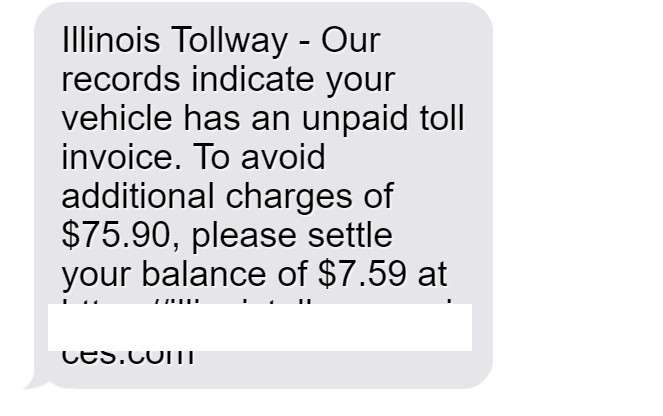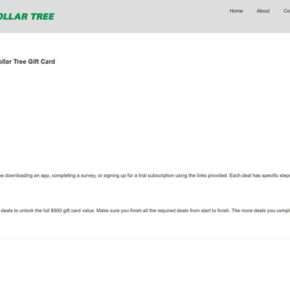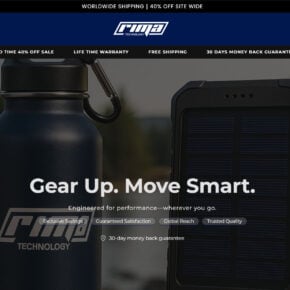Many Illinois drivers have recently reported receiving a fraudulent text message claiming their vehicle has unpaid Illinois Tollway invoices. This phishing scam directs victims to a fake website to steal their personal and financial information. This in-depth guide will examine how this text message toll scam works, provide tips to identify and avoid it, and explain what to do if you fall victim.

An Overview of the Illinois Tollway Text Invoice Scam Targeting Illinois Drivers
This scam begins when a text is sent to random phone numbers across Illinois, crafted to appear it came from the official “Illinois Tollway.” The message claims the recipient’s vehicle has unpaid tollway invoices, threatening added fees if immediate payment isn’t made.
A link is provided to what’s disguised as the official Illinois Tollway website, but actually routes to a sophisticated fake toll payment portal controlled by scammers. If entered, personal and financial information is directly harvested for identity and financial theft.
These text scams aim to capitalize on fears over owing state tolls and penalties to override critical thinking. The relatively small $7 unpaid invoice amount seems plausible for a rushed driver. And the threat of almost $76 in additional fees causes panic that obscures the fraud.
In reality, the Illinois Tollway never initiates contact via text, nor do they allow toll payments on third-party websites. But the convincing messages and professional-looking fake portal tricks unwitting recipients.
How the Illinois Tollway Text Scam Targets Victims
The Illinois Tollway invoice scam unfolds in distinct stages designed to collect as much personal data as possible:
Stage 1: Target Receives a Text About Unpaid Tolls
The scam’s launch point is an unsolicited text sent to the victim’s smartphone stating:
“Illinois Tollway – Our records indicate your vehicle has an unpaid toll invoice. To avoid additional charges of $75.90, please settle your balance of $7.59 at https://illinoistollwayservices.com”
The odd dollar amounts sound plausibly real. And fears of owing the state money make recipients more likely to act quickly.
Stage 2: The Text Contains a Fake Website URL
The text includes a URL that appears to link directly to the official Illinois Tollway website. However, the domain name is slightly altered and the site itself is an elaborate forgery.
Victims who click the link are taken to the fraudulent website crafted entirely by scammers posing as the real Illinois Tollway.
Stage 3: Users Directed to the Fake Website
Victims who click the link out of urgency end up at the scam website dressed up to mirror the official Illinois Tollway portal. The scheme disguises itself as the legitimate avenue to pay the outstanding invoices.
Stage 4: Website Requests Personal and Credit Card Information
The fake website presents a form asking users to enter personal, identity, and credit card information to pay the toll invoices mentioned in the initial scam text. Details requested include:
- Full legal name
- Date of birth
- Driver’s license number
- Vehicle information
- Residential address
- Phone number
- Email address
- Full credit card number
- CVV code
- Expiration date
This allows scammers to directly collect both personal identity data and financial account access.
Stage 5: Criminals Steal Entered Information
Once submitted, the website processes the data which is directly harvested by the scammers who set up the fraudulent toll payment portal.
Users see a fake confirmation message thanking them for paying their outstanding invoice. In reality, they just handed their details right over to scammers.
Stage 6: Scammers Commit Identity and Financial Theft
With stole personal information and credit card details, criminals can engage in identity theft by impersonating their victims online and financially by making fraudulent purchases.
Additional crimes enabled include opening new credit cards and loans, taking out payday advances on bank accounts, filing fake tax returns for refunds, and medical insurance fraud.
Provided contact info also allows targeting victims for additional scam attempts via email, phone, and text.
The Outcome: Victims Must Repair Identity and Credit Damage
Victims must now invest substantial time and money resolving identity theft and fraudulent financial activity. This includes placing fraud alerts, contesting unauthorized charges, and continuously monitoring credit reports for new abuse enabled by the scammers.
This demonstrates why it’s critical to identify and avoid text phishing scams purporting to be from the Illinois Tollway instead of clicking suspicious links.
What To Do if You’re Targeted by the Illinois Tollway Text Scam
If you receive an unsolicited text message about unpaid Illinois Tollway invoices, there are important immediate steps to take:
- Do not click any links in the text message. Visiting the website could lead to device infection or entering personal data.
- Contact the Illinois Tollway directly at 1-800-UC-IPASS to verify the text. Legitimate contacts will never be initiated via text message.
- Look up the official Illinois Tollway website independently from the phone number on the back of your transponder or paperwork. Never use links in texts.
- Forward the scam text to 7726 (SPAM) to report it so your cell provider can block the sender’s number.
- File a scam report with the Illinois Attorney General at www.illinoisattorneygeneral.gov and the FTC at www.reportfraud.ftc.gov. Include the phone number, screenshot, website link, and content.
- Monitor all financial accounts closely for fraudulent transactions for several months following any scam targeting. Report unauthorized activity immediately.
- Consider freezing credit files at Equifax, Experian and TransUnion to block identity theft and new fraudulent accounts. This causes minor delays when you apply for credit, but prevents major financial damage.
- Change online account passwords and enable two-factor authentication wherever available. Avoid password reuse so a compromised password only provides access to one account.
Being proactive is the most effective way to minimize damage from providing any sensitive data to scammers via their fake Illinois Tollway payment portal.
Avoiding Illinois Tollway Text Message Invoice Scams
Here are some key tips to spot and avoid invoice scams pretending to be from the Illinois Tollway:
- The Illinois Tollway only contacts registered customers – never random texts to the general public. Any unprompted texts should be considered highly suspicious.
- Slow down and read messages fully before clicking links. Scams instill false urgency and threats to override critical thinking.
- Independently look up and verify the real website or phone number instead of using what’s provided in texts. Search sites like IllinoisTollway.com for contact info.
- The Illinois Tollway offers a mobile app for notifications and payments. Scams conveniently ignore this existing option.
- Contact the Illinois Tollway directly to confirm legitimacy anytime you receive a surprising notice by phone, email, mail or text.
- Check the URL of linked websites carefully before entering information. Secure real websites will start with “https://” and show a lock icon. Scams use “http://”.
- No legitimate company will request personal or financial account details by text or email. This information should only be entered on verified and trusted websites you manually navigate to.
- Setup text message blocking through your cell provider. Most allow filtering numbers not in your contacts which can help filter some scam texts.
- Place fraud alerts and consider credit freezes to prevent identity theft if you have reason to believe your details are compromised. This restricts access to your credit history when new accounts are opened.
Exercising caution and verifying unexpected payment notices directly rather than rushing to click mystery links can prevent falling victim to invoice scams impersonating Illinois Tolls. Learn the common tricks used in these text phishing attempts to identify and avoid compromising your identity and financial data.
Frequently Asked Questions About the Illinois Tollway Invoice Text Scam
1. How do I identify the Illinois tollway invoice text scam?
The most obvious red flags of the Illinois Tollway invoice text scam include receiving an unsolicited text message stating you owe money, threats of additional penalties, and a link to a suspicious third-party website rather than the official IllinoisTollway.com portal. The Illinois Tollway also confirms they never contact drivers by text message.
2. What details do the scam text messages contain?
The Illinois tollway scam texts reference a specific unpaid invoice amount, often around $7, and threaten extra charges nearing $100 if immediate payment is not made. They include a link to a fake website disguised as the official Illinois Tollway payment portal.
3. What information does the fake Illinois Tollway website ask for?
The fraudulent Illinois Tollway website prompts users to enter personal details like name, birthdate, driver’s license number, address, phone, and email. It crucially also asks for full credit card information including card number, CVV code, and expiration date.
4. How does providing data to the fake website enable identity theft?
Entering personal identity details like your name, license number, and address provides scammers the keys to commit identity theft in your name. They can open fake accounts, file fraudulent tax returns, access health services, and perpetrate other identity fraud using your stolen PII.
5. How can scammers use my credit card details obtained through the fake site?
Scammers can sell your credit card information on the dark web or use it directly themselves to make fraudulent purchases at your expense. They can also withdraw cash advances from associated bank accounts, racking up big unauthorized charges.
6. Why do the scam text messages instill urgency and threaten additional fees?
By threatening immediate penalties, the scam texts create panic that causes recipients to act quickly without scrutinizing the messages logically. This urgency overrides critical thinking that would identify the fraudulent website.
7. How can I report the Illinois Tollway text scam?
You should report scam texts to the Illinois Attorney General at www.illinoisattorneygeneral.gov, the Federal Trade Commission at www.reportfraud.ftc.gov, and forward texts to 7726 (SPAM) so your phone carrier can block the sender.
8. What steps should I take if I entered information into the fake Illinois Tollway website?
If you entered any personal or financial data, immediately contact your credit card company and banks to monitor for fraudulent charges. Place fraud alerts on your credit files, change account passwords, and consider freezing your credit to prevent identity theft damages.
9. How can I avoid falling for the Illinois Tollway text scam in the future?
Carefully scrutinize any text messages about unpaid invoices, verify independently with the Tollway instead of using links or numbers provided, monitor financial statements routinely, and learn to identify the warning signs of text phishing scams.
10. Who is responsible for sending the deceptive Illinois Tollway invoice text scams?
Illinois Tollway officials confirm these scam text messages are being sent by sophisticated cybercriminal groups aiming to steal personal information for financial gain, not the actual state agency. Report scam texts to aid law enforcement investigations.
The Bottom Line
This scam exploiting Illinois drivers’ fears of owing tolls and penalties illustrates how text message phishing has become a preferred technique for fraudsters. A convincing text and professionally replicated website combine to deceive recipients into handing over swaths of personal data easily used for identity and financial theft.
However, understanding the scam process makes avoiding these traps much easier. Approaching messages claiming urgent unpaid bills with skepticism, verifying independently, and checking URLs before entering data reduces the chances of being fooled. Those targeted still must act swiftly to minimize damage, but awareness of invoice text scams can prevent much hassle down the road.
No driver wants penalties and late fees from missed toll road payments. But allowing urgency to override critical thinking when scared with fines only puts privacy and finances further at risk. By being vigilant, verifying toll notices, and implementing fraud prevention tools, Illinois drivers can steer clear of invoice scams and focus on the open road ahead.




